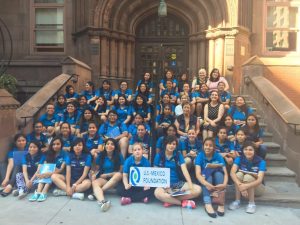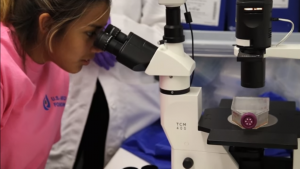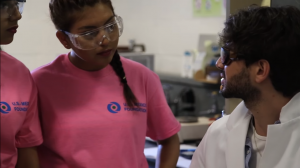Through Education for Better, the Western Union Foundation works to create a world where access to quality education is a right for everyone. This global corporate and philanthropic commitment, which runs through 2020, draws on Foundation strategic philanthropy and the strength of Western Union® business assets; placing a key focus on empowering women, youth, migrants and refugees through traditional and skills-based education. To highlight our philanthropic efforts, we’re placing a spotlight on WU Foundation grantee and guest blogger, the U.S.-Mexico Foundation (USMF). Please read further to learn more about their work and how their programs are helping break down barriers to educational opportunity.

 The USMF is grateful to the Western Union Foundation for its continued support and partnership, and is working to expand its network of partners to reach more students by taking the program to additional states in Mexico.
Learn more about the program by watching the video about these young women and their experience in our program.
Rebeca Vargas,
President & CEO
U.S.-Mexico Foundation
[i] UNESCO Institute for Statistics, UIS Fact Sheet: Women in Science (2015).
[ii] Anna Beninger, High Potentials in Tech-Intensive Industries: The Gender Divide in Business Roles (Catalyst, 2014).
[iii] “Women and Men in Mexico, 2012”, by INEGI
The USMF is grateful to the Western Union Foundation for its continued support and partnership, and is working to expand its network of partners to reach more students by taking the program to additional states in Mexico.
Learn more about the program by watching the video about these young women and their experience in our program.
Rebeca Vargas,
President & CEO
U.S.-Mexico Foundation
[i] UNESCO Institute for Statistics, UIS Fact Sheet: Women in Science (2015).
[ii] Anna Beninger, High Potentials in Tech-Intensive Industries: The Gender Divide in Business Roles (Catalyst, 2014).
[iii] “Women and Men in Mexico, 2012”, by INEGI
Guest Blog: The U.S. Mexico Foundation
The U.S.-Mexico Foundation (USMF) is empowering Mexican female high school students from underserved communities through the only binational STEM mentoring program for female high school students in Mexico. The impact of the program is amazingly moving and inspiring. In a rapidly advancing and increasingly interconnected world, the areas of science, technology, engineering and mathematics (STEM) have become more important than ever. For developing countries such as Mexico, STEM disciplines offer an enormous potential for economic growth and development, and may offer the key to social mobility for millions of people. At the same time, many sectors continue to struggle to find qualified people to fill these positions. This gap is especially high among women, both in Mexico and abroad. According to UNESCO[i], averaged across regions worldwide, women make up less than 30% of the workforce in scientific research and development. In a 2014 book by Anna Beninger about the gender divide in tech fields, she cites a lack of role models as a major barrier to retention and advancement of women in STEM fields[ii]. In Mexico, these social and economic barriers are particularly notable. Young women from low-income backgrounds are often forced to drop out school to work at an early age in order to support their families. In many cases, tradition and cultural norms often serve as barriers for economic mobility. Some parents still teach their daughters that a woman’s key role and aspiration should be within the home. Statistics indicate that 80% of engineering jobs in Mexico are held by men[iii]. In 2015, to address these challenges, the USMF launched the first stem mentoring program for young women in Mexico with the generous help of donors from the public and private sectors, including the Western Union Foundation. The USMF designed the program tailoring it to the Mexican reality and implements the program in collaboration with the departments of education (SEP) of the states of Puebla and Sonora, the Universidad Nacional Autónoma de Mexico (UNAM), the Benemerita Universidad Autónoma de Puebla (BUAP), The Universidad de las Americas en Puebla (UDLAP), the Instituto Nacional de Astrofísica, Optica y Electronica (INAOE), professors from Teachers College at Columbia University and the Massachusetts Institute of Technology (MIT) in the U.S., as well as the support of hundreds of female STEM professionals who volunteer their time as program mentors. All of the students participating in the program come from public high schools in low income communities, with many from rural areas. Through the 10-month program, Mil Niñas, Mil Futuros (1,000 girls, 1000 futures), (#MilNinasMilFuturos, #MujeresEnSTEMmx), the students have access to one-on-one mentoring, STEM training, local activities, gatherings and fieldtrips, and the opportunity to attend a STEM summer camp when graduating from the program.


 The USMF is grateful to the Western Union Foundation for its continued support and partnership, and is working to expand its network of partners to reach more students by taking the program to additional states in Mexico.
Learn more about the program by watching the video about these young women and their experience in our program.
Rebeca Vargas,
President & CEO
U.S.-Mexico Foundation
[i] UNESCO Institute for Statistics, UIS Fact Sheet: Women in Science (2015).
[ii] Anna Beninger, High Potentials in Tech-Intensive Industries: The Gender Divide in Business Roles (Catalyst, 2014).
[iii] “Women and Men in Mexico, 2012”, by INEGI
The USMF is grateful to the Western Union Foundation for its continued support and partnership, and is working to expand its network of partners to reach more students by taking the program to additional states in Mexico.
Learn more about the program by watching the video about these young women and their experience in our program.
Rebeca Vargas,
President & CEO
U.S.-Mexico Foundation
[i] UNESCO Institute for Statistics, UIS Fact Sheet: Women in Science (2015).
[ii] Anna Beninger, High Potentials in Tech-Intensive Industries: The Gender Divide in Business Roles (Catalyst, 2014).
[iii] “Women and Men in Mexico, 2012”, by INEGI




